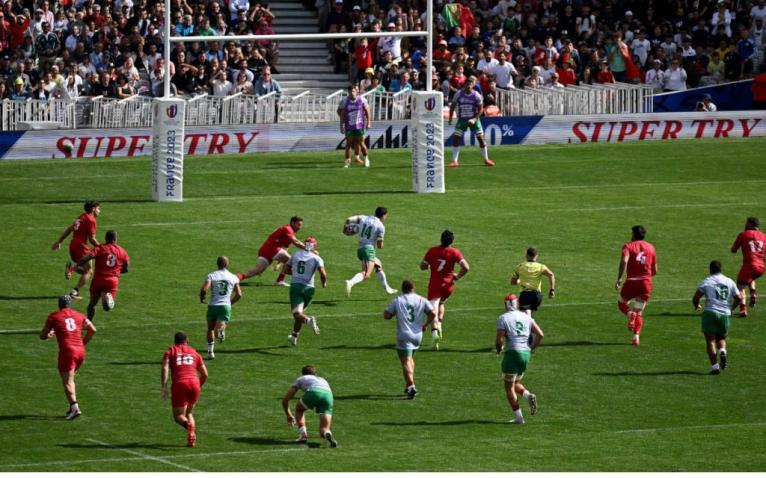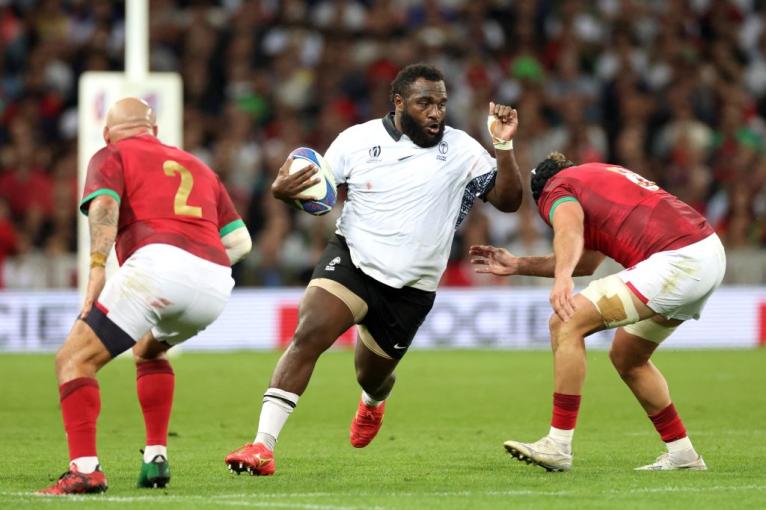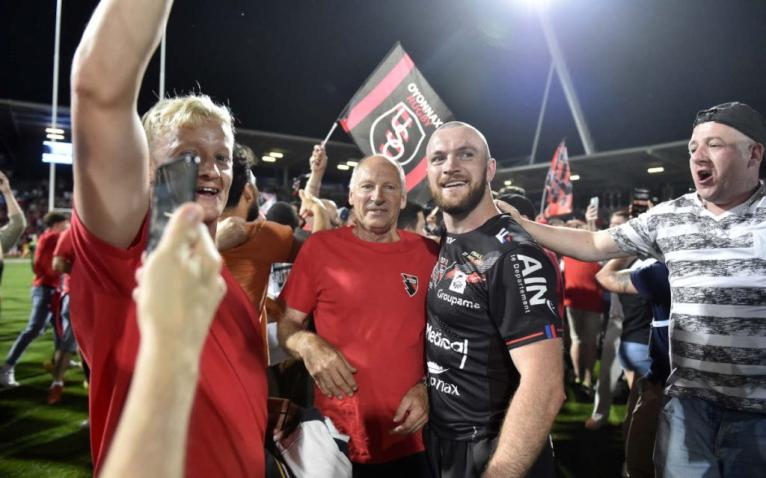The ProD2 is rugby’s land of opportunity. The French second tier has become a perfect stepping stone for those with potential to become star players, no matter their national allegiance. It is a tournament laden with history, from the rustic rural stadia to the fanatical support, and populated by rising luminaries from across the world.
Local talent flows through the competition, of course. Melvyn Jaminet is now a fully fledged French international. Nathanel Hulleu has stepped up emphatically from Vannes to Castres in the Top 14 this season. Antoine Aucagne could be the next off the conveyor belt after an impressive campaign with Aurillac.
But around this French core, a rich blend of international athletes thrives. Men from as far and wide as Algeria, USA, Samoa, Portugal and the Cook Islands ply their trade in the ProD2, earning crucial sporting and cultural experiences and often, climbing to bigger things. The ProD2 can be their golden ticket.

Raffaele Storti’s case is a perfect example of how the league pushed a burgeoning young player to break new ground. After failing to make the Stade Français first team, the Portugal flying machine was loaned to Beziers and in two years became one of the most prolific try-scorers of the competition, earning himself a new contract with the Parisian giants. Storti leads this season’s try-scoring charts with an incredible 20 in 17 games.
“No doubt about it,” Storti says, when asked if the ProD2 is viewed as a ‘must-do’ competition.
“It is an excellent platform to show your best skills and go big. As it is a lengthy competition, the staff tends to make far better use of their squads, gifting chances to newcomers and players who are looking to clinch that opportunity. As the games are played on Thursdays and Fridays, the ProD2 is widely watched in France as there’s no Top14 or any kind of rugby competition going on.”
With the expansion of the Rugby World Cup to 24 teams, more of those on the cusp of qualification will make it to Australia in 2027. The ProD2 plays a massive role in developing and preparing so many of their protagonists.
Teams in the lower levels of the URC should take a closer look at more unusual foreign markets.
Georgia’s successful Rugby Europe Championship campaign was underpinned by the 16-strong Black Lion franchise contingent but there were still a dozen ProD2 players involved. Portugal’s historic World Cup achievements in France were influenced hugely by the league. Fijians Lekima Tagitagivalu, Sireli Maqala, Luke Tagi and Peni Ravai trampolined to greater heights after a short spell in the ProD2.
More than 230 emerging nations players feature in the division this season, with at least 40 more playing at espoir (academy) level, and over 100 have scored a try. Storti leads the way, with Samoan hooker Elia Elia and Fijian Eroni Sau prominent in the rankings too. Over one quarter of all ProD2 tries this season have been scored by emerging nations players with close to 20 different countries represented on the try-scoring ledger.
Stade Montois has the widest national diversity of scorers while Aurillac has selected the broadest range of nationalities (16) this season. They are far from alone. It seems ProD2 clubs understand the value of exploring different markets, and offering shots to players passed over by the top-tier competitions in both hemispheres.
Indeed, beyond the headline acts from Portugal, Georgia or the Pacific Islands, you will find talent from lesser-known rugby territories. Issam Hamel, the mighty Algerian hooker, steers Brive’s mauls; Moroccan speedster Karim Qadiri has scored 34 tries in his long ProD2 career; bone-crunching number eight Tyrone Vi’iga hails from the Cook Islands. All are first-team picks.
“The Pro D2 is the perfect level to allow teams to take risks while also paying a good wage,” says rugby analyst Sam Larner. “The English Championship generally pays poorly and is hampered by Brexit which makes it almost impossible for players to come over if they’ve not featured at a very high level. Teams in the lower levels of the URC should take a closer look at more unusual foreign markets. The Dragons and Zebre Parma prop up the URC table and they have just three emerging nations represented in their squads: Dmitri Arhip (Moldova), Ratko Jelic (Serbia), and Fetuli Paea (Tonga).

“Provence, who led the ProD2 until last weekend, have Germans, Colombians, Samoans and Fijians. The ProD2 seems to have an open-mindedness to trying new things and bringing in players from other areas. It’s something poorer teams in the Premiership or URC should do, but are often too reluctant to do something different and it failing, and so spend money chasing players from New Zealand and South Africa who are second tier with first tier price points.”
In February, Aurillac’s director of rugby Walter Olombe explained why ProD2 teams bet big on an alternative strategy.
“Clubs like Aurillac aren’t from big cities, and normally French players tend to prefer to be closer to the main hubs,” he said.
“So, players who come from a rugby context that isn’t so professional, tend to not think twice and sign with us. We have had a good experience working with national teams, like Netherlands, and finding common ground to help develop players in the best possible fashion. Those players are spirited, work non-stop, and keep trying to be the best version of themselves.”
This trend has not been without jarring issues. In some cases, clubs have pressured players not to answer the call of their national team during Test windows. Be it because of a fixture overlap, a national union’s refusal to cover wages in those weeks away, or travelling constraints, this tug of war can provoke friction between club and country.
The French competitions provided opportunities to Fijian players, especially to those that had finished their U20s pathway.
One can argue the marathon thirty-round ProD2 season makes players less comfortable to leave their clubs. If the international window between February and March happens during a critical moment of the domestic season, the November or July Tests shouldn’t be a problem, but there have been issues with them as well.
Former Spanish international Mathieu Bélie revealed in French podcast La Cravate that Nevers pressured him to not play for Spain between 2016 and 2019, prompting a negative atmosphere to develop between club, player, and nation.
There is plausibility in both sides of the argument. Clubs want to be compensated by unions for the loss of their players. Unions want clubs to act fairly and respect the international regulations. For the fans, a sense of disbelief and frustration sets in when squads are announced and star ProD2 players are conspicuous by their absence. This is a situation which needs to be resolved.
For countries where professional contracts are just a mirage, the ProD2 may provide short-term answers. Simon Raiwalui, former Fiji head coach and World Rugby’s high performance pathways and player development manager, reminds us how it was for Fijians before the Drua came to be.
“There are great competitions that have provided playing opportunities to many players from various countries that do not have the same opportunities elsewhere,” he said. “For example, before Fiji had the Drua, access to other competitions was very limited or none at all. The French competitions provided opportunities to Fijian players, especially to those that had finished their U20s & U23s pathways.”

To understand the increased growth across those emerging nations, it is important to acknowledge how the ProD2 has influenced their set-ups, weaving a web of connections and knowledge which has helped them become fierce competitors at the top level.
Add to that, the signing of youth players who start their journey early, and are slowly moulded into part of not only their country’s legacy, but also of those French clubs who invested in them, always on the search for a new star. There are problems when recruiting young players from wildly different backgrounds. Some felt alone, isolated and abandoned by their clubs, slipping into poor mental health and worse. But if the hiring is done correctly, with a proper support system and long-term plan in place, the league can become a brilliant pathway for those who dare to dream. Clubs have made vital player welfare improvements over the past few years.
And so the ProD2 has blossomed into one of the most coveted plazas of the rugby world, and it will continue to flourish as long as this diverse crop of players flows through its teams.


Would be amazing to have Servette Genève reaching this level
No longer a one way stream of players giving and clubs taking i hope
Great article. No insights to add, just wanted to say that. :)